Politics
Lisa Murkowski’s sleepless night and billion dollar Alaska win that saved Trump’s megabill
After hours of pacing, bargaining and pressure, Senator Murkowski flipped her vote and delivered a razor-thin victory for Trump’s sweeping tax and spending overhaul

When Senator Lisa Murkowski was spotted pacing alone through a Senate hallway just after midnight, few realized they were watching history unfold. The fate of Donald Trump’s massive tax and spending package — dubbed the “One Big Beautiful Bill Act” — came down to one person: Alaska’s moderate Republican.
At the time, Murkowski told reporters she hadn’t yet decided. “No,” she said quietly, holding up her hand to dodge questions. But by midday Tuesday, she’d cast the crucial 51st “yes” vote, sending the 887-page megabill through the Senate and back to the House for final approval.
“Probably the most difficult and agonizing legislative 24-hour period that I have encountered,” Murkowski later admitted, visibly exhausted. “I haven’t slept in a long, long while now.”
Murkowski held the line—and used it
A seasoned lawmaker with 23 years in the Senate, Lisa Murkowski is no stranger to tough votes. Her swing-vote status has placed her at the center of some of the chamber’s most divisive debates — from Trump’s 2021 impeachment to the Brett Kavanaugh confirmation in 2018.
This time, she didn’t just cast a deciding vote — she bargained hard for Alaska, and won big.
According to Senator John Cornyn of Texas, “She knows how to use her leverage.” Indeed, Alaska was mentioned in the bill 19 times — more than California, Texas, or New York — with carveouts for tribal health care, food assistance waivers, tax relief for fisheries and whalers, and new oil and gas lease sales.
Alaska wins big while Murkowski walks a tightrope
Even with her state’s generous treatment, Murkowski remained deeply conflicted. Nearly one-third of Alaska’s population is on Medicaid, and healthcare infrastructure is already strained by geography and cost.
In the end, she secured key additions that addressed her concerns:
- A $50 billion rural hospital fund proposed by Senator Susan Collins
- A delay in new SNAP penalties for states like Alaska with historically high error rates
- Exemptions from work requirements for certain tribal communities
“I had to look on balance,” she said. “The people in my state are the ones that I put first.”
Behind the scenes negotiations and Trump’s shadow
For hours, GOP leadership wooed Murkowski. Senator John Thune and Senator John Barrasso circled her on the Senate floor. Senator Lindsey Graham and Alaska’s own Dan Sullivan joined the huddle at times. And even Trump’s White House got involved, trying to reassure Murkowski that the bill would benefit Alaska.
Despite her past clashes with Trump — including voting to convict him after the Capitol riot — Murkowski played kingmaker in handing him a legislative win just ahead of his desired July 4th deadline.
Criticism from both sides
Not everyone was pleased.
Senator Rand Paul (R-KY) blasted the last-minute Alaska provisions as “pork and subsidies.” On the left, Senator Amy Klobuchar (D-MN) warned that loosening oversight on food stamps would “expand the graft.”
Still, Collins defended Murkowski: “The fact is, Alaska is unique from every other state.” That uniqueness, she said, justified the special treatment.
A lonely vote in a frigid chamber
In the hours before the vote, Murkowski sat wrapped in a blanket to keep warm in the cold Senate chamber, sifting through amendment drafts and budget memos with her staff. Ultimately, she made her decision — and when Thune called for the final vote, Murkowski, still somber, cast her “aye.”
Her vote sent the bill over the finish line, even as three Republicans, including Collins, voted “no” due to concerns over cuts to Medicaid and food assistance.
Politics
Brendan Carr to face Senate grilling after “free speech firestorm” over Jimmy Kimmel controversy — Ted Cruz calls remarks “dangerous as hell”
FCC Commissioner Brendan Carr will testify before the Senate Commerce Committee after his comments suggesting ABC affiliates could lose their licenses over Jimmy Kimmel’s remarks on Charlie Kirk’s killing triggered backlash from both parties.

Federal Communications Commission (FCC) Chairman Brendan Carr is set to testify before the Senate Commerce Committee following an escalating free speech controversy that began with his comments about Jimmy Kimmel last month.
Carr’s upcoming appearance — confirmed by a committee representative and first reported by Semafor — comes after weeks of intense political and media scrutiny surrounding his remarks that appeared to threaten broadcast licenses of ABC affiliates over Kimmel’s coverage of the killing of conservative activist Charlie Kirk.
ALSO READ : Charlie Hunnam reveals chilling transformation into serial killer Ed Gein for Ryan Murphy’s Monster… “I didn’t want to glamorize it”
The hearing, to be chaired by Republican Senator Ted Cruz, will mark the first time Carr has publicly addressed the controversy since it ignited a bipartisan debate about government overreach and free speech protections in broadcasting.
The controversy: Kimmel’s remarks and Carr’s warning
The uproar began on September 17, when Carr appeared on a conservative YouTube talk show and reacted to comments Kimmel made on Jimmy Kimmel Live! following the reported assassination of Charlie Kirk, a prominent right-wing activist and founder of Turning Point USA.
During the interview, Carr implied that local ABC affiliates could face repercussions from the FCC for airing Kimmel’s segment.
“When we see stuff like this, look, we can do this the easy way or the hard way,” Carr said. “These companies can find ways to change conduct, on Kimmel, or there’s going to be additional work for the FCC ahead”
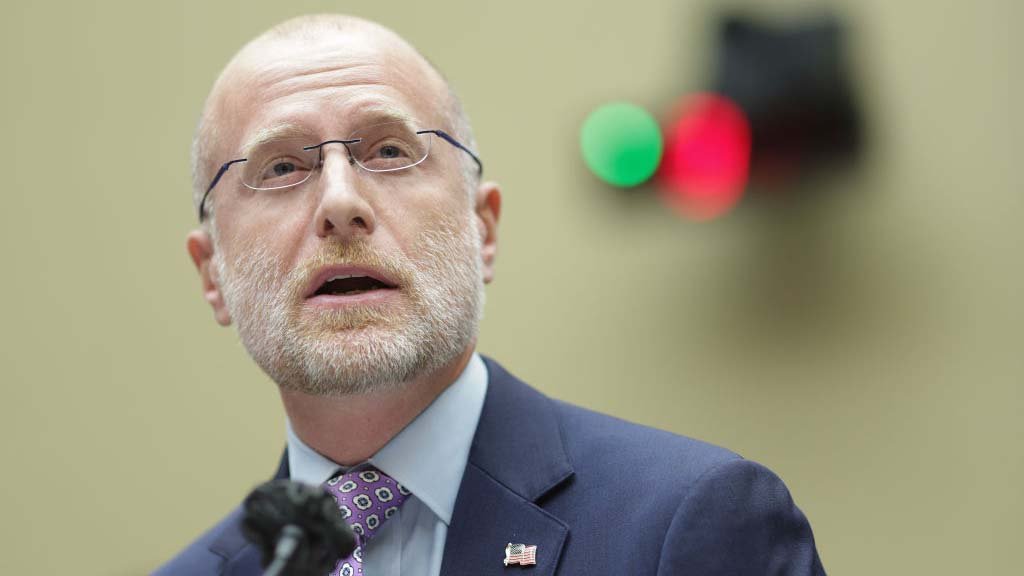
WASHINGTON, DC – MARCH 31: Brendan Carr, Commissioner at the Federal Communications Commission (FCC) testifies during a House Energy and Commerce Committee Subcommittee hearing on March 31, 2022 in Washington, DC. The subcommittee held a hearing on oversight of the FCC. (Photo by Kevin Dietsch/Getty Images)
The remarks were widely interpreted as a threat to use regulatory power to punish speech critical of conservatives — a move that many across the political spectrum condemned as a violation of First Amendment principles.
Ted Cruz calls Carr’s comments “mafioso-like”
Even Senator Ted Cruz, one of the most prominent Republican voices in Congress and typically an ally of conservative regulators, sharply rebuked Carr’s comments on his podcast, Verdict with Ted Cruz.
“I think it is unbelievably dangerous for government to put itself in the position of saying we’re going to decide what speech we like and what we don’t,” Cruz said. “And we’re going to threaten to take you off air if we don’t like what you’re saying.”
Cruz likened Carr’s comments to “something a mafioso would say,” warning that any government official who uses their authority to influence editorial content poses a fundamental threat to free expression.
Fallout: Disney, Nexstar, and Sinclair respond
Carr’s statement had immediate and dramatic consequences across the media industry. Two major broadcast groups — Nexstar Media Group and Sinclair Broadcast Group — both owners of ABC affiliates, announced shortly after his comments that they would **temporarily preempt Jimmy Kimmel Live! ** in several markets.
In the days that followed, Disney, which owns ABC, announced that Jimmy Kimmel Live! would be “indefinitely suspended” pending internal review of the controversy.
The timing of the suspension further complicated matters for Nexstar, which is currently seeking FCC approval for a $6 billion acquisition of Tegna Inc. — a deal that now risks being scrutinized more closely amid questions about FCC impartiality and Carr’s public comments.
The free speech firestorm
Civil rights and media advocacy groups quickly condemned Carr’s comments as an abuse of power and a chilling signal for journalists and entertainers.
The American Civil Liberties Union (ACLU) released a statement saying that any attempt to use broadcast licensing as leverage over political content “violates the spirit and letter of the First Amendment.”
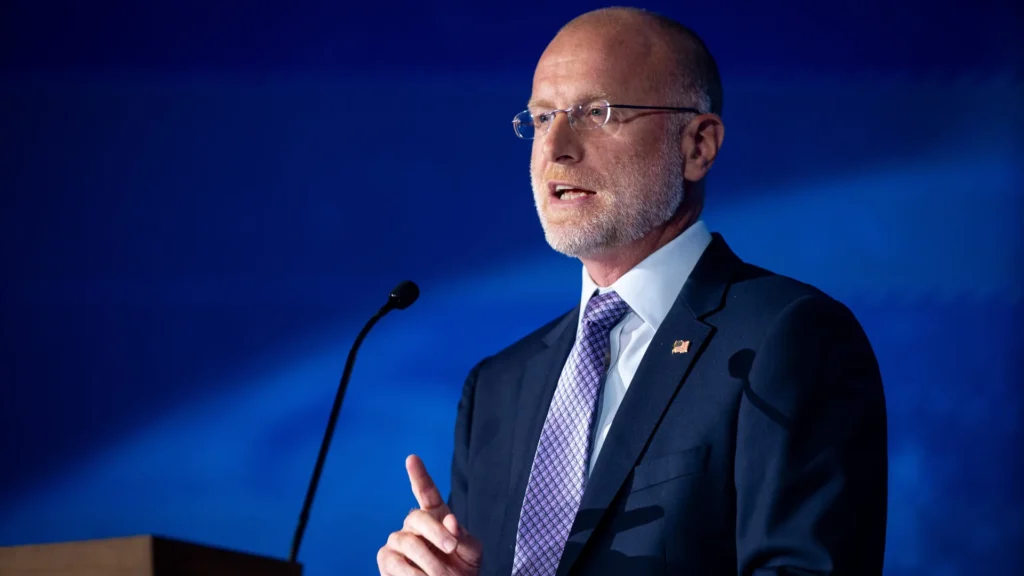
Media ethicist Jeff Jarvis also criticized Carr, calling his remarks “a warning shot at the heart of journalistic independence.”
“When regulators start hinting at consequences for satire or criticism, that’s not regulation — that’s intimidation,” Jarvis said.
The controversy has also reignited discussion over FCC neutrality, with lawmakers on both sides calling for clearer boundaries between regulatory oversight and editorial content.
Carr’s defense and the upcoming testimony
While Carr has not issued a full apology, he defended his remarks in follow-up interviews, claiming that his comments were “taken out of context” and that his concern was about broadcast standards, not political speech.
Still, the pressure has mounted for transparency. His forthcoming testimony before the Senate Commerce Committee is expected to address not only his comments but also broader issues surrounding media regulation, political bias, and FCC independence.
Cruz, who will preside over the hearing, has indicated that the committee intends to question Carr about the “appropriate limits of FCC authority in matters of speech.”
“We’re not going to let the FCC become an arbiter of acceptable expression,” Cruz told reporters this week.
The larger implications
The incident has reignited an old debate over how much power federal regulators should have over broadcasters in the era of partisan media and viral outrage.
If Carr’s comments were intended as an offhand warning, the fallout has proven how seriously such remarks are taken when made by officials with real regulatory influence.
As the FCC continues to oversee billion-dollar broadcast mergers and licenses, Carr’s appearance before the Senate could become a defining moment — not only for his career but also for how Washington approaches the intersection of free speech, media criticism, and political influence in the digital age.
Politics
Justice Samuel Alito admits he still disagrees with same-sex marriage ruling but surprises audience with what he said next…
In a rare moment of restraint, Justice Samuel Alito made it clear he doesn’t support overturning Obergefell v. Hodges, the 2015 landmark ruling that legalized same-sex marriage across the United States.
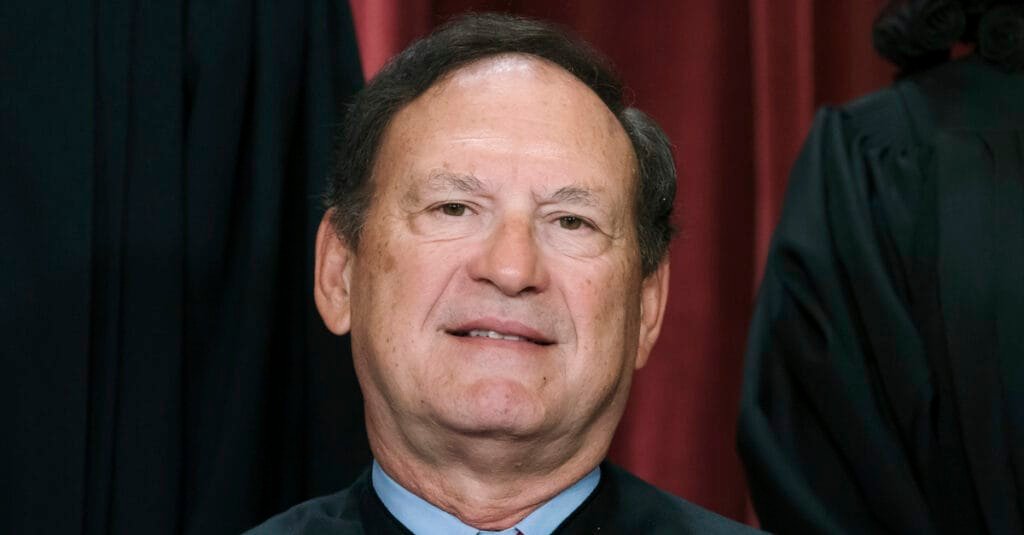
At a recent academic conference, Justice Samuel Alito — one of the most conservative members of the U.S. Supreme Court — revisited one of the most consequential cases in modern American civil rights history: Obergefell v. Hodges (2015), the decision that legalized same-sex marriage nationwide.
While Alito didn’t hold back in expressing his personal disagreement with the ruling, he offered an unexpected disclaimer — one that immediately captured headlines.
ALSO READ : Massive fire erupts at Chevron refinery near Los Angeles… residents told to stay indoors
“I am not suggesting that the decision in that case should be overruled,” Alito told attendees at the C. Boyden Gray Center for the Study of the Administrative State on October 3. “I have to state that so that what I say today is not misunderstood.”
That line — subtle yet deliberate — signaled that even though Alito remains ideologically opposed to the court’s decision, he recognizes Obergefell as binding precedent.
Alito, who wrote the controversial 2022 opinion that overturned Roe v. Wade and ended the constitutional right to abortion in the United States, emphasized that the ruling on abortion did not intend to undermine other precedents such as same-sex marriage.
“Obergefell v. Hodges,” Alito said during the conference, “is a precedent of the court that is entitled to the respect afforded by the doctrine of stare decisis.”
For context, stare decisis is the legal principle that courts should follow established precedent when making decisions, ensuring stability and predictability in the law.

A Complex History of Dissent
Justice Alito’s opposition to Obergefell is not new. Back in 2015, he was among the four dissenting justices — alongside Clarence Thomas, John Roberts, and the late Antonin Scalia — who warned that the ruling could conflict with religious liberties.
Alito’s dissent back then argued that the Constitution does not guarantee a right to same-sex marriage, stating that the issue should be left to voters and legislators, not the courts.
Nearly a decade later, however, his tone appeared less confrontational. Analysts suggest Alito’s statement may be a pragmatic attempt to distance himself from ongoing calls within conservative circles to revisit Obergefell following the fall of Roe v. Wade.
Religious Freedom vs. Civil Rights
His remarks come as the Supreme Court faces renewed pressure from activists seeking to revisit same-sex marriage. A former Kentucky county clerk, Kim Davis, who famously refused to issue marriage licenses to same-sex couples in 2015 due to her religious beliefs, has petitioned the court to reconsider the decision.
While Alito’s speech did not reference Davis directly, his words seemed to serve as a quiet message to those expecting him to lead another constitutional reversal.
“His comment that Obergefell is precedent deserving respect signals that the Court is unlikely to reopen that battle,” said Neal Katyal, former Acting Solicitor General under President Barack Obama, in a statement to legal reporters.
Why Alito’s Words Matter Now
Since the overturning of Roe v. Wade in 2022, there has been widespread concern among civil rights groups that other landmark rulings — such as those protecting same-sex marriage (Obergefell) and contraception rights (Griswold v. Connecticut) — might be next on the chopping block.
Alito’s cautious tone may reflect the Court’s awareness of the political and social shockwaves that another reversal could unleash. Legal scholars suggest that even among the Court’s conservative bloc, there is little appetite to reopen Obergefell amid a deeply polarized electorate.
According to SCOTUSblog analysts, Alito’s remarks could be interpreted as a signal of institutional preservation — a recognition that overturning Obergefell might undermine public trust in the Court, already shaken after Dobbs v. Jackson Women’s Health Organization.
The Ongoing Cultural Divide
Alito’s comments reignited debate on social media platforms like X (formerly Twitter), where users quickly dissected his speech. Some praised his acknowledgment of precedent, while others viewed it as a strategic move to avoid backlash rather than a genuine change of heart.
“Justice Alito still disagrees with Obergefell, but it’s telling that he’s now talking about respect for precedent,” wrote Laurence Tribe, a prominent Harvard constitutional scholar, on X. “That’s a sign of how deeply Obergefell has been woven into American life.”
As the cultural and legal battles over marriage equality continue, one thing seems clear: even the Court’s most conservative voices now recognize the permanence of same-sex marriage in America’s constitutional landscape.
Whether that acknowledgment is rooted in legal respect or political caution — only time will tell.
Politics
Trump sparks outrage with racist AI-generated video of Schumer and Jeffries as shutdown looms
Hours after tense White House talks, Trump posts a manipulated video mocking Democratic leaders while funding negotiations stall.
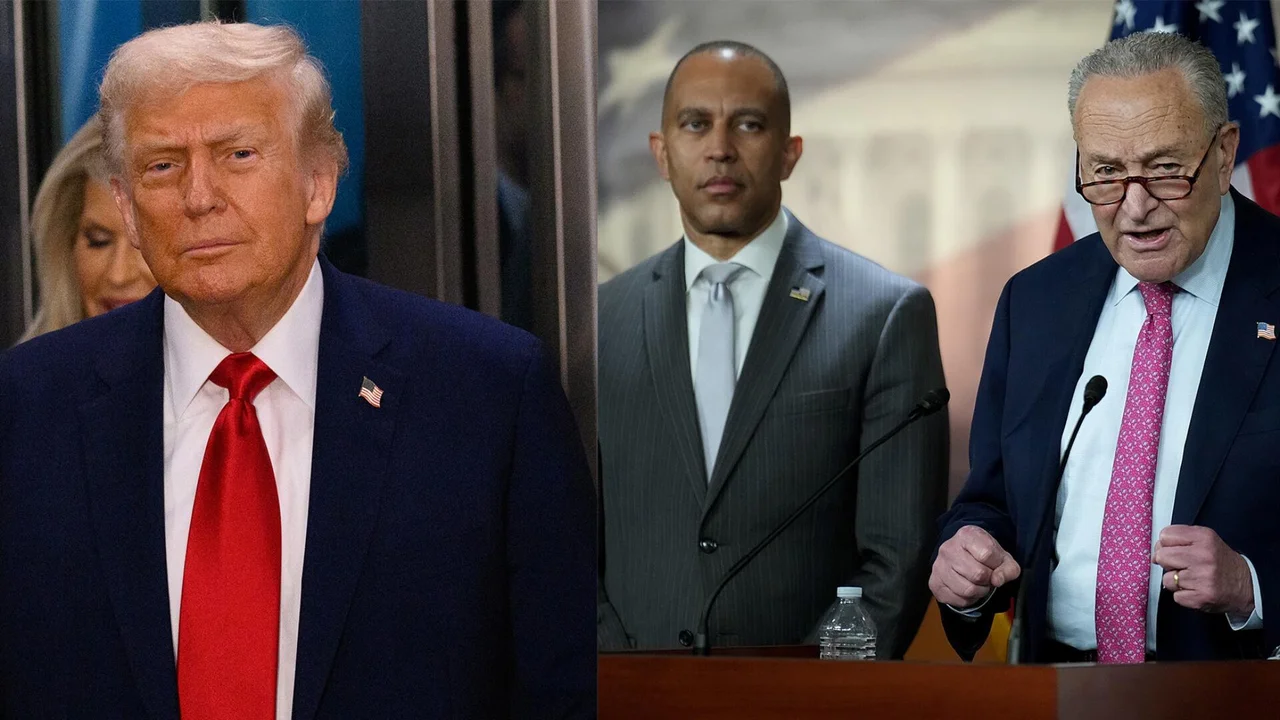
As the United States inches closer to a federal government shutdown, Donald Trump (Wikipedia | X) has inflamed tensions with a controversial social media post. The President shared a video that appears to be AI-generated, depicting Chuck Schumer and Hakeem Jeffries in a racially offensive and mocking light.
The video, posted on both Trump’s X account and Truth Social, shows Jeffries wearing a sombrero and mustache, while Schumer’s voice is altered to deliver fake lines about giving undocumented immigrants “free healthcare.” Mariachi music plays in the background as the doctored voice claims: “Nobody likes Democrats anymore.”
The post landed just hours after a White House meeting where Schumer and Jeffries confronted Trump over looming funding deadlines.
Democrats hit back
Jeffries swiftly condemned the video, writing on X:
“Bigotry will get you nowhere. Cancel the Cuts. Lower the Cost. Save Healthcare. We are NOT backing down.”
Schumer echoed the sentiment, responding:
“If you think your shutdown is a joke, it just proves what we all know: You can’t negotiate. You can only throw tantrums.”
The exchange underscores how far apart both sides remain, with government funding set to expire at midnight Tuesday.

White House meeting yields no deal
Alongside Trump, the meeting also included John Thune , the Senate Majority Leader, and Mike Johnson , the Speaker of the House. Negotiations collapsed without progress, leaving the country hours away from a shutdown that could furlough federal workers and disrupt services nationwide.
Schumer told reporters afterward: “Trump is the decision maker. If he accepts basic provisions to protect healthcare, we can avoid this crisis. But there are still large differences between us.”
Democrats are demanding an extension of Affordable Care Act subsidies that expire at the end of the year. Republicans, however, want a “clean” funding bill without policy riders.
Healthcare at the heart of the fight
Jeffries stressed the stakes for ordinary Americans:
“More than 20 million Americans are on the brink of higher premiums, co-pays, and deductibles because Republicans refuse to extend ACA tax credits. Working-class families are the ones at risk.”
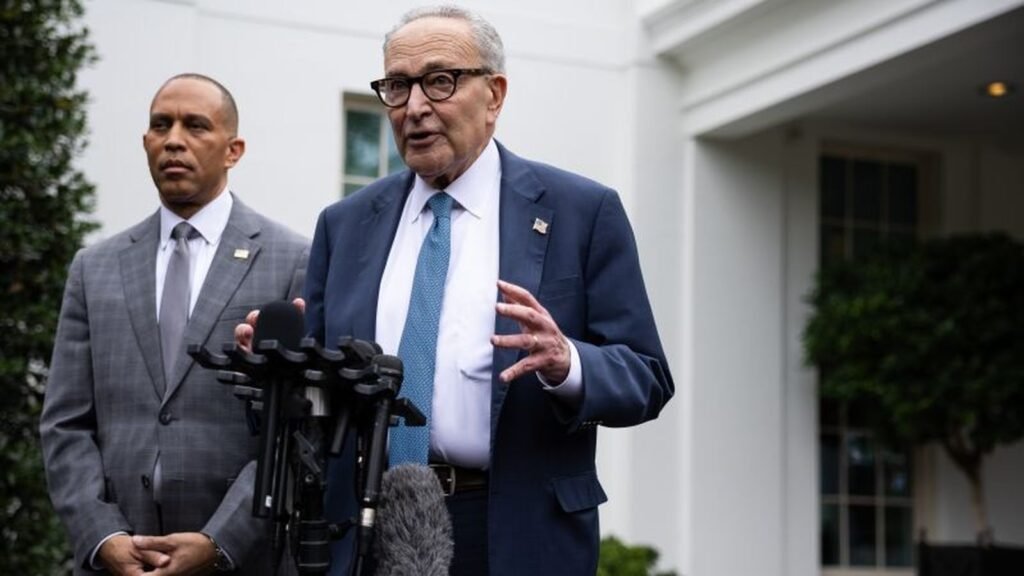
Analysts note that the impasse mirrors past shutdown battles where healthcare, immigration, and spending cuts became flashpoints.
The bigger picture: AI, politics, and disinformation
The AI-generated video raises fresh concerns about how manipulated media is being deployed at the highest levels of politics. Experts warn that such content could further polarize voters ahead of the 2026 midterms.
While Trump’s loyal supporters hailed the post as “humor,” critics argue it trivializes the severity of a government shutdown and fuels racial stereotypes. The White House has yet to formally comment.
With time running out, the focus now shifts back to Congress — and whether either side can compromise before the deadline. For now, Trump’s video has added yet another layer of controversy to an already bitter standoff.
For more Update http://www.dailyglobaldiary.com
-

 Entertainment1 week ago
Entertainment1 week agoDolly Parton delays Las Vegas concerts by nine months citing health challenges but promises unforgettable return
-

 Entertainment1 week ago
Entertainment1 week agoZoey Deutch engaged to comedian Jimmy Tatro after 4 years of dating with romantic beach proposal
-

 Entertainment4 days ago
Entertainment4 days agoSurvivor Season 49 episode 2 shocker Kele tribe loses again and fans stunned by who went home
-

 Sports3 days ago
Sports3 days ago‘Silent killer’ Cam Schlittler stuns Red Sox as Yankees rookie makes history with 12 strikeouts
-

 Crime & Justice5 days ago
Crime & Justice5 days agoProsecutors demand 11 years for Diddy after shocking trial says Cassie’s testimony revealed dark truth
-

 Politics1 week ago
Politics1 week agoBarack Obama blasts Trump over Tylenol autism claim calling it ‘violence against truth’ but that’s not all he said…
-

 Sports5 days ago
Sports5 days agoTottenham’s Champions League wake-up call… why Spurs must stop looking like a Europa League side
-

 Sports2 days ago
Sports2 days agoShohei Ohtani finally pitches in MLB playoffs after 2,746 days… will this be the moment that defines Dodgers vs Phillies?
















